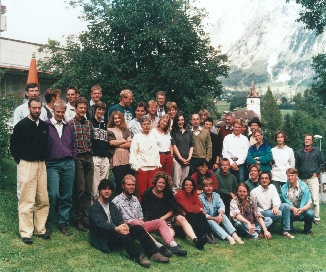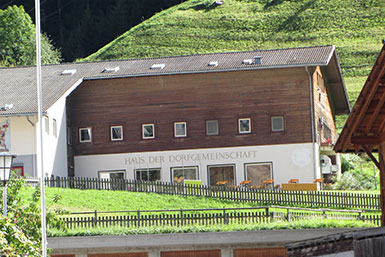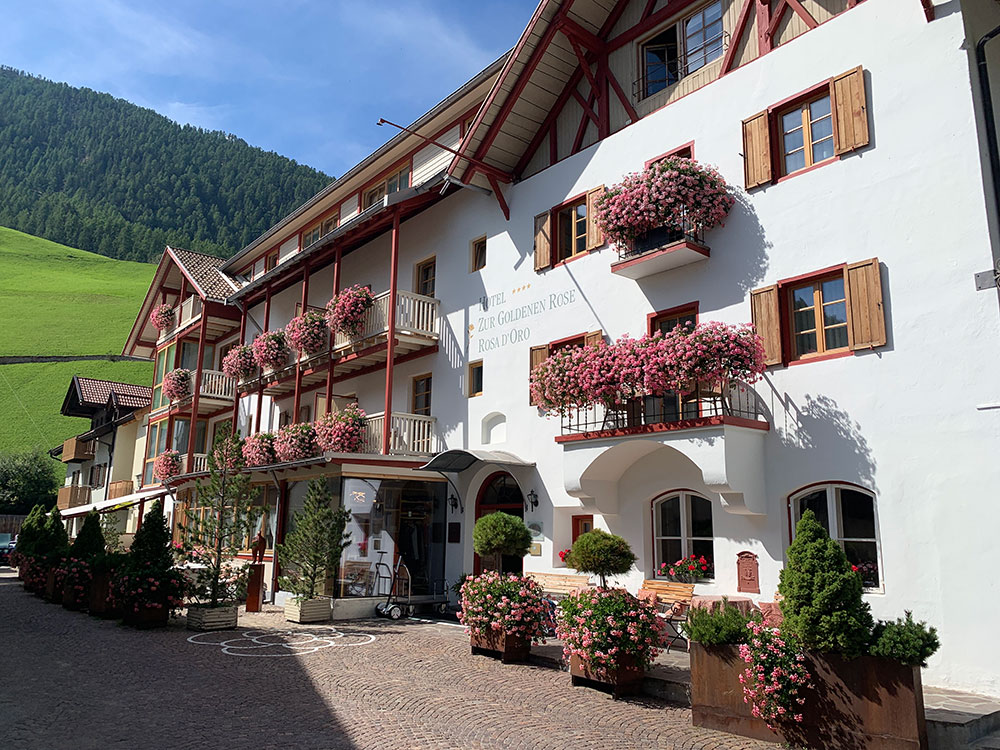The start in Grindelwald
 The European Ice Sheet Modelling Initiative (EISMINT) was launched by the European Science Foundation in 1992. EISMINT aimed to examine the critical links between global climate change and ice sheets by improving mathematical modelling in a number of key areas. Funding of this programme by the members of the European Science Foundation run from 1993 through 1997.
The European Ice Sheet Modelling Initiative (EISMINT) was launched by the European Science Foundation in 1992. EISMINT aimed to examine the critical links between global climate change and ice sheets by improving mathematical modelling in a number of key areas. Funding of this programme by the members of the European Science Foundation run from 1993 through 1997.
As part of the programme it was envisaged to organize a summer course for Ph.D. students and junior scientists. The EISMINT Committee asked Hans Oerlemans to convene a course, and so it happened. The first course took place in Grindelwald, Switzerland, from 8 August till 6 September 1995. There were 33 participants, following lectures, working on computer projects, and participating in an excursion to the Jungfraujoch and Observatory. The course was a succes and filled a clear need, so the decision to do it a second time was made soon.
The move to Karthaus
 However, the venue was not considered optimal and after some looking around it was decided to held the second course in Karthaus, a nice small village in the Schnalstal (northern Italy, not far from Merano). And that is how the Karthaus courses started (in fact, Georg Kaser found this place).
However, the venue was not considered optimal and after some looking around it was decided to held the second course in Karthaus, a nice small village in the Schnalstal (northern Italy, not far from Merano). And that is how the Karthaus courses started (in fact, Georg Kaser found this place).
Somehow funding was found to keep the train rolling, albeit only every second year in the beginning. Since 2007 the course has been organized annually. Until 2018 the course was convened by Hans Oerlemans, after that Carleen Tijm-Reijmer took over. Through the years, major support has come from the Institute for Marine and Atmospheric Research (Utrecht University), the Niels Bohr Institute (University of Copenhagen), the Paul Crutzen Fund for German-Dutch collaboration in climate research, SVALI (Nordic countries - Centre of Excellence), the Ice2Sea Programme (EU), The Descartes Prize (EPICA, EU), and The Netherlands Earth System Science Centre.
The formula of the course has not changed much over the years: lectures in the morning, exercises and projects in the afternoon, running or hiking to refresh brains and body, and then a five-course meal in the evening with subsequent scientific discussions in the bar. The majority of the teachers normally stays for the entire duration of the course, creating a very informal and stimulating atmosphere.
The village and the course
 A few words about Karthaus, this splendid village in the Schnalstal, and Hotel Goldene Rose. It is almost impossible to describe the incredible hospitality of Stefania and Paul Grüner and their staff. Being the heart of the course, where all students and teachers gather again and again, and sometimes mingle with the ‘locals’, Goldene Rose will hopefully be the home of this course for a long time to come.
A few words about Karthaus, this splendid village in the Schnalstal, and Hotel Goldene Rose. It is almost impossible to describe the incredible hospitality of Stefania and Paul Grüner and their staff. Being the heart of the course, where all students and teachers gather again and again, and sometimes mingle with the ‘locals’, Goldene Rose will hopefully be the home of this course for a long time to come.
Music always played an important role in the evenings. Songs were created and performed (Andrew Fowler frequently being one of the drivers), and live tango music filled the dining room every now and then. The tango crash courses given by Hilmar Gudmundsson will be remembered by many. In recent years the dinner has often been concluded by the fine jazzy sounds from Frank Pattyn at the piano. Some texts and recordings can be found on the Karthaus website.
About 650 students have now participated in the courses and learned about cryospheric science. Teachers, technicians and local hotel staff have all contributed to the succes of the course through the years. On behalf of the glaciological community: thank you !
List of lecturers
Abermann, Jakob (2009, 2010, 2011)
Bentley, Mike (2022, 2023, 2024)
Björnsson, Helgi (1997)
Blunier, Thomas (2011, 2012, 2013, 2014, 2015, 2016, 2017, 2018, 2022, 2023, 2025)
Bueler, Ed (2009, 2010, 2012, 2014)
Buizert, Christo (2010, 2011)
Buzzard, Sammie (2024)
Dahl-Jensen, Dorthe (1995, 1997, 2002, 2005, 2008, 2009, 2010, 2011, 2014)
de Boer, Bas (2013, 2018)
DeConto, Rob (2010)
Eisen, Olaf (2008, 2009, 2011, 2013, 2015, 2017, 2019, 2023, 2025)
Fischer, Hubertus (2007, 2008, 2009, 2010)
Fowler, Andrew (1995, 1997, 2000, 2002, 2003, 2005, 2007, 2008, 2009, 2011)
Giesen, Rianne (2011)
Gomez, Nathalya (2024)
Greuell, Wouter (2002, 2003, 2005)
Gudmundsson, Hilmar (1997, 2000, 2002, 2003, 2005, 2007, 2008, 2009, 2010, 2011, 2012, 2013, 2014, 2015)
Helsen, Michiel (2008, 2009, 2010)
Henry, Clara (2025)
Hewitt, Ian (2014, 2016, 2017, 2018, 2019, 2022, 2023, 2024, 2025)
Hindmarsh, Richard (1995)
Howat, Ian (2009, 2010, 2012, 2014)
Huybrechts, Philippe (2002)
Jenkins, Adrian (1995, 1997, 2000, 2002, 2003, 2005, 2007, 2008, 2009, 2010, 2011, 2012, 2013, 2014, 2015, 2017, 2018)
Kääb, Andy (2013)
Karlsson, Nanna (2012, 2013, 2014, 2015, 2017, 2018, 2019, 2022, 2023, 2024, 2025)
Kaser, Georg (1997, 2000, 2002, 2003, 2005, 2008)
Keisling, Benjamin (2023, 2024, 2025)
Keller, Felix (2018, 2023, 2025)
Kuhn, Michael (2008, 2009, 2010, 2011, 2013)
Kuipers-Munneke, Peter (2012)
Kyrke-Smith, Teresa (2016)
Lambeck, Kurt (1997, 2000, 2003, 2005, 2008, 2010, 2013)
Mayer, Christoph (2000, 2002)
Miller, Heinz (1997, 2000, 2002)
Milne, Glenn (2007, 2009, 2011)
Mölg, Thomas (2007, 2008, 2009, 2010, 2011)
Mulvaney, Rob (2002, 2003, 2005)
Navarro, Paco (2012, 2014, 2016, 2018, 2022)
Ng, Felix (2010, 2012, 2013, 2015)
Nick, Faezeh (2014, 2016)
Oerlemans, Hans (1995, 1997, 2000, 2002, 2003, 2005, 2007, 2008, 2009, 2010, 2011, 2012, 2013, 2014, 2015, 2016, 2017, 2018, 2019, 2022, 2023, 2024, 2025)
Pattyn, Frank (2013, 2015, 2016, 2017, 2018, 2019, 2022, 2023, 2024)
Paul, Frank (2011, 2012)
Payne, Tony (2003, 2005, 2007)
Pedersen, Vivi (2025)
Peltier, Dick (1995)
Pettit, Erin (2024)
Pollard, Dave (2003)
Reese, Ronja (2022, 2024, 2025)
Reijmer, Carleen (2003, 2005, 2010, 2012, 2014, 2015, 2016, 2017, 2019, 2022, 2023, 2024, 2025)
Roth, George (2017)
Rott, Willy (2000, 2002, 2007)
Sandberg Sørensen, Louise (2024)
Spada, Giorgio (2016, 2017, 2018, 2019)
Stauffer, Bernhard (1995, 1997, 2000, 2003)
Straneo, Fiamma (2016)
Stroeven, Arjen (2005, 2007, 2011, 2012, 2013, 2014, 2015, 2016, 2017, 2018, 2019)
Svensson, Anders (2019)
van de Berg, Willem Jan (2009, 2012, 2018, 2023, 2025)
van de Wal, Roderik (2002, 2003, 2008, 2011, 2012, 2014, 2015)
van den Berg, Jojanneke (2007, 2008)
van den Broeke, Michiel (2000, 2002, 2007, 2008, 2010, 2011)
van Pelt, Ward (2014)
Vieli, Andreas (2011)
Vinther, Bo (2009)
Whitehouse, Pippa (2012, 2014)
Winkelmann, Ricarda (2019, 2023)
